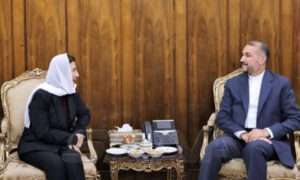The Region: A Middle East Newsletter
THE REGION is a weekly news digest summarizing significant Middle East developments that will be of interest to the English-speaking audience. The news items in THE REGION are curated by ACLS experts and drawn from a wide range of English, Arabic, and other regional language sources. Subscribe to this weekly newsletter and daily intercepts here.
23 January 2023
Printable Version
SYRIA
 Iran International reported this week about an IRGC plan to establish an air defense system in Syria.
Iran International reported this week about an IRGC plan to establish an air defense system in Syria.
The Syrian regime, supported by Russian forces, has also reactivated the “Al-Jarrah ” military airport in Manbij, in the eastern countryside of Aleppo, claiming it is aimed at enhancing the regime’s ability to confront Israeli raids.
The United States also sent more than 100 military vehicles to its base in Hasaka during the last three days.
ISIS operations in Syria have reportedly increased to an average of one attack per day during the past two weeks despite the security operations carried out by the Syrian Democratic Forces with the support of the International Coalition Forces. In Syria’s southern region, ISIS claimed responsibility for 34 targeting operations, which it said resulted in the killing of 51 people.
Three one-way kamikaze drones attacked the Coalition base at al-Tanf base in southeast Syria. Two of the drones were shot down, but the third hit the compound, wounding two Syrian opposition fighters.
On January 22, CENTCOM released a statement about conducting a partnered helicopter and ground assault raid in northeast Syria capturing two ISIS-Syria members. The statement reiterated CENTCOM’s mission to defeat ISIS alongside the Syrian Democratic Forces.
At least 16 Syrian refugees who were displaced from Afrin were killed on Saturday when a 5-story inhabited building collapsed in the Kurdish-controlled Sheikh Maqsoud neighborhood in Aleppo. The displacement crisis since 2011 has prompted many people to resort to living in damaged and almost destroyed buildings that lacked basic infrastructure and services.
Canadian Federal Judge Henry Brown ruled for the repatriation of four men, six women, and 13 infants, all of them Canadian citizens, from the ISIS detention camps in northeast Syria. At the same time, a UN committee condemned France for refusing to return French citizens detained in the same camps.
Bashar al-Assad’s advisor Bouthaina Shaban attended the Iranian regime’s “Women of Influence” conference on behalf of Assma Assad in Tehran this week. During her visit, she also met with Iran’s foreign minister Abdollahian and discussed the joint coordination between the two countries.
![]()
IRAN
 The European Parliament adopted a resolution on Thursday to add “the Iranian Revolutionary Guard, its affiliated forces, including the Popular Mobilization Forces (Basij) and the Quds Force” on the EU’s list of designated terrorists.
The European Parliament adopted a resolution on Thursday to add “the Iranian Revolutionary Guard, its affiliated forces, including the Popular Mobilization Forces (Basij) and the Quds Force” on the EU’s list of designated terrorists.
The commander of the IRGC, Hossein Salami, issued a statement on Saturday saying the Europeans will bear the consequences if they make the unforgivable mistake of including his organization on the blacklist of terror organizations.
On Sunday, Muhammad Baqer Qalibaf, Speaker of Iran’s Islamic Consultative Assembly (parliament) said that if the EU designates the IRGC as terrorists, then his country “will consider all European military institutions as terrorists. And from now on, none of the European military institutions in the region will be safe, and even their military advisors will not feel safe in their embassies.”
Iranian foreign minister Abdollahian told reporters after the closed parliamentary session that Iran is considering withdrawing from the nuclear Non-Proliferation Treaty. He added that if European leaders do not “move on the path of wisdom and don’t rectify their views every possibility is probable.”
The Jerusalem Post, however, cited EU foreign affairs chief Josep Borrell telling reporters, this Monday, before a meeting of foreign ministers in Brussels, that the EU cannot designate the IRGC as terrorists without a court decision first.
Narges Mohammadi, Iranian spokeswoman for the Center for Human Rights Defenders, continues to publish reports detailing the solitary confinement, interrogations, harsh conditions, and lack of access to medical treatment for female detainees in Evin prison.
Thirty female political prisoners in Evin prison released a memorandum calling for a halt to the execution of protestors and an end to the unfair and non-transparent sentences against the detainees. Among the signatories are the French-Iranian researcher Fariba Adlelkhah, the German-Iranian activist Nahid Taqawi and Fayezeh Hashemi, the daughter and deputy of former Iranian president Rafsanjani. Part of the letter explained that no matter the differences between the prisoners’ religious beliefs, political ideologies, and their origins, they were collectively sentenced to 124 years in prison. “This is the equivalent of several generations of human life,” they said at the end of the letter.
Despite a decline in the number of demonstrations, the Iranian currency continues to fall in value and Iranians continue to defy the Mullah regime by means of strikes, writing slogans, and destroying government banners. Demonstrations in the poor Sunni-majority region of Baluchistan continued this Friday for the 16th consecutive week but security and intelligence agents launched a new wave of arrests aimed at the young people of Baluchistan.
More than 300,000 Iranians signed a petition endorsing Iran’s exiled crown prince, Reza Pahlavi, giving him power of attorney to meet official political representatives and lead a transition from clerical to secular rule.
![]()
LEBANON

Zeynab Nasrallah, daughter of Hizballah leader Hassan Nasrallah, attended an Iranian regime conference called “Women of influence,” this week. In her speech, Zeynab said that Lebanese women have the greatest influence in raising Mojahedin children to present them to the path of resistance, adding that this resistance has caused the enemy and the occupation forces to retreat in Syria, Bahrain, Yemen, and all the countries of the resistance front.
Israeli army official spokespman Avichay Adraee wrote a Facebook post commenting on Nasarallah’s daughter assertions of “the resistance” and asserting that her father’s decisions in 2006 [to conduct a war against Israel] had caused Nasrallah to become a prisoner. Adraee added that while Nasarallah speaks with confidence, passing threats and warnings, he is not able to move freely to visit his family. Adraee said that Hizballah’s internal tensions are not just about financial difficulties, but rather threaten the organization’s morale, prompting Hizballah leaders to use Zainab in a public relations game. Adraee’s final message was addressed to Nasarallah’s daughter, saying “O Zainab, the one who prevents the flow of normal life for you and for all Lebanese, is your father.”
![]()
ISRAEL
 Following a Supreme Court ruling that deemed Aryeh Deri’s appointment as health and interior minister “extremely unreasonable” because of a prior tax offense conviction, the Likud party announced its plans to change the judicial system giving left-wing judges less power.
Following a Supreme Court ruling that deemed Aryeh Deri’s appointment as health and interior minister “extremely unreasonable” because of a prior tax offense conviction, the Likud party announced its plans to change the judicial system giving left-wing judges less power.
In response, more than 100,000 Israeli citizens protested against the plan on Saturday, marking one of the largest protests in Israeli history. Opponents say any judicial changes may help Mr. Netanyahu evade conviction in his pending corruption trial, or make the court case disappear altogether.
During the Cabinet session on Saturday, Mr. Netanyahu officially dismissed Deri after making it clear that the two cabinet positions would remain with Deri’s hardline Shas party.
![]()
TURKIYE
 Sweden’s bid for NATO membership may be facing a dead end after the leader of a Danish far-right political party burned the Quran in front of Turkiye’s embassy in Stockholm last week. Ankara cancelled the Swedish defense minister’s visit to Turkiye in response to Sweden’s permission for a planned burning of the Quran. Demonstrators in front of the Swedish consulate in Istanbul called upon the Turkish government “to sever its relations with Sweden.”
Sweden’s bid for NATO membership may be facing a dead end after the leader of a Danish far-right political party burned the Quran in front of Turkiye’s embassy in Stockholm last week. Ankara cancelled the Swedish defense minister’s visit to Turkiye in response to Sweden’s permission for a planned burning of the Quran. Demonstrators in front of the Swedish consulate in Istanbul called upon the Turkish government “to sever its relations with Sweden.”
Turkish foreign affairs minister Cavsuoglu’s visit to Washington last week came with Turkiye’s request to finalize a deal for Turkiye to purchase F-16s–a deal Senator Bob Menendez has vowed to block. Cavsuoglu urged the U.S. Congress not to consider the Sweden and Finland’s NATO bid and the purchase of the fighters as related issues. In a joint U.S.-Turkish statement released after Cavusoglu’s meetings, the sides announced they have agreed to continue holding consultative talks on the purchase of F-35 jets.
Turkish media reported that Mr. Cavusoglu also “criticized the U.S. for losing its policy of balance regarding ongoing tensions between Turkiye and Greece.”
Syrian opposition media reported that Ankara asked Washington to appoint a special US envoy for Syria to ensure increased US interest in Syria and reduce the influence of Brett McGurk, coordinator for the Middle East and Africa.
Six million members of Turkiye’s Generation X will be voting this year in Turkiye. During a youth conference in northwestern Bursa province, President Erdogan announced that elections will be held on May 14, almost one month before they were scheduled.
![]()
LIBYA & EGYPT
 The Libyan government of Abdul Hamid Dhabiba hosted a meeting of Arab foreign ministers in Tripoli this week, sparking surprise by the rival government of Fathi Bashagha. Though boycotted by Egypt, Saudi Arabia, and the President of the Arab League, the meeting was attended by 3 Arab foreign ministers, the Tunisian, Algerian, and Qatari, while Oman, Sudan, Mauritania, Comoros, Somalia and Palestine sent delegates.
The Libyan government of Abdul Hamid Dhabiba hosted a meeting of Arab foreign ministers in Tripoli this week, sparking surprise by the rival government of Fathi Bashagha. Though boycotted by Egypt, Saudi Arabia, and the President of the Arab League, the meeting was attended by 3 Arab foreign ministers, the Tunisian, Algerian, and Qatari, while Oman, Sudan, Mauritania, Comoros, Somalia and Palestine sent delegates.
During the conference, Dhabiba’s foreign affairs minister Ms. Najlaa Al Mankoush said Dhabiba’s National Unity Government was committed to holding elections, ending the transitional stage, and preventing the country from sliding into chaos.
In Egypt, President Sisi hosted Antonio Tajani, Deputy Prime Minister of Foreign Affairs of Italy this Sunday. The Italian Foreign Minister pointed out that this visit represents a clear message of the strength of historical relations between the two countries, and affirms the desire of the Italian government to consolidate and advance these relations during the next stage.
Egypt and Sudan held Irrigation and Water Resources ministerial meetings this week to discuss and develop the work of the permanent Egyptian-Sudanese Technical Authority for Nile Water, one of the oldest mechanisms of cooperation between the two countries. The two sides emphasized the necessity of “sincere cooperation with the Nile Basin countries.”
Hizballah leader Hasan Nasrallah in Lebanon lashed out at Saudi Arabia and Egypt this week. He ridiculed the current economic hardships in Egypt, arguing that Egypt was the first country to have signed a peace treaty with Israel but is now abandoned by America. Nasrallah added that the United States does not want a strong state in the region, but rather wants its people to keep “running after a loaf of bread.” The Egyptian Ministry of Foreign Affairs posted a statement on its official Facebook page describing Nasarallah’s remarks as “absurd.”
![]()
IRAQ
 After a series of measures imposed by the US Federal Reserve Bank concerning dollar transfers, Iraq’s Deputy Central Bank Governor Ammar Khalaf announced on Sunday that the central bank has the capability to make all financial transactions electronic.
After a series of measures imposed by the US Federal Reserve Bank concerning dollar transfers, Iraq’s Deputy Central Bank Governor Ammar Khalaf announced on Sunday that the central bank has the capability to make all financial transactions electronic.
On Monday morning, the Iraqi News Agency reported that Prime Minister al-Sudani decided to relieve the Central Bank Governor Mustafa Makhaif of his post, at Makhaif’s request, and assigned Ali Al-Alaq to run the Central Bank by proxy. The Turkish news outlet Daily Sabah attributed the dismissal of the Iraqi Central Bank Governor to the drop of the Iraqi dinar, explaining that Iraq’s banking situation mirrors Lebanon’s banking collapse due to corruption and money laundering.
![]()
THE GULF & YEMEN
 Iran’s former ambassador to China for four years told the Iranian Labour News Agency that the 25-year strategic agreement with China is a document without any value. Malaek claimed that the wrapped-in-mystery agreement has had few practical results and was used by China merely to entice other Arab countries.
Iran’s former ambassador to China for four years told the Iranian Labour News Agency that the 25-year strategic agreement with China is a document without any value. Malaek claimed that the wrapped-in-mystery agreement has had few practical results and was used by China merely to entice other Arab countries.
A close member to the Saudi Royal Court denied Houthi rumors regarding salaries and unilateral talks between the Houthis and the Kingdom.



